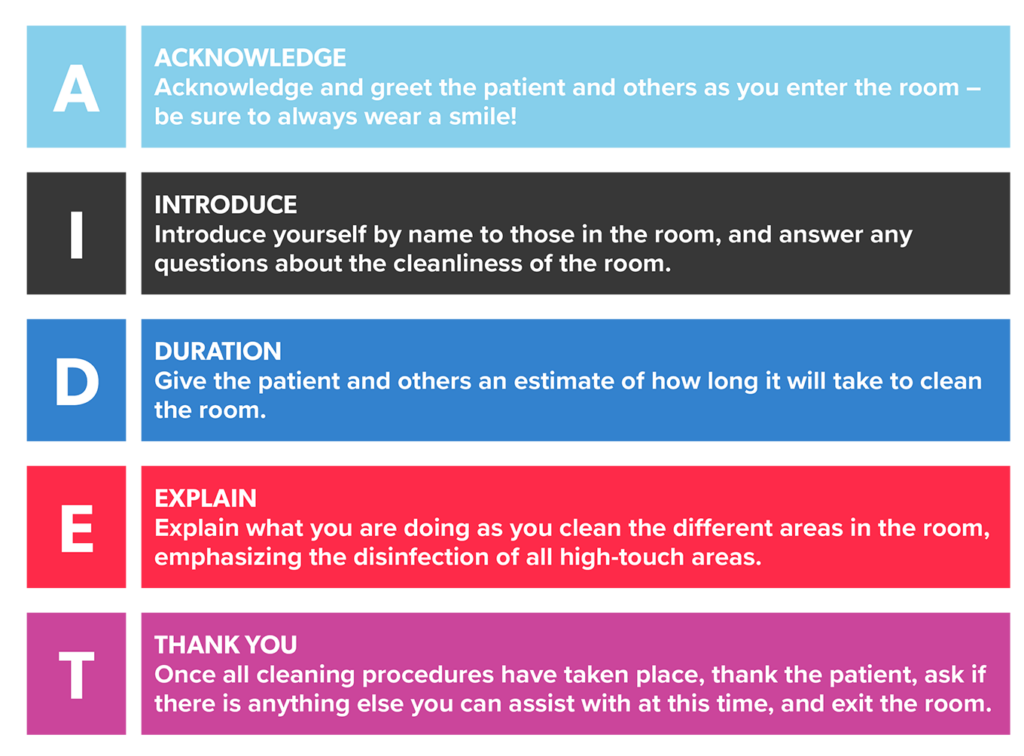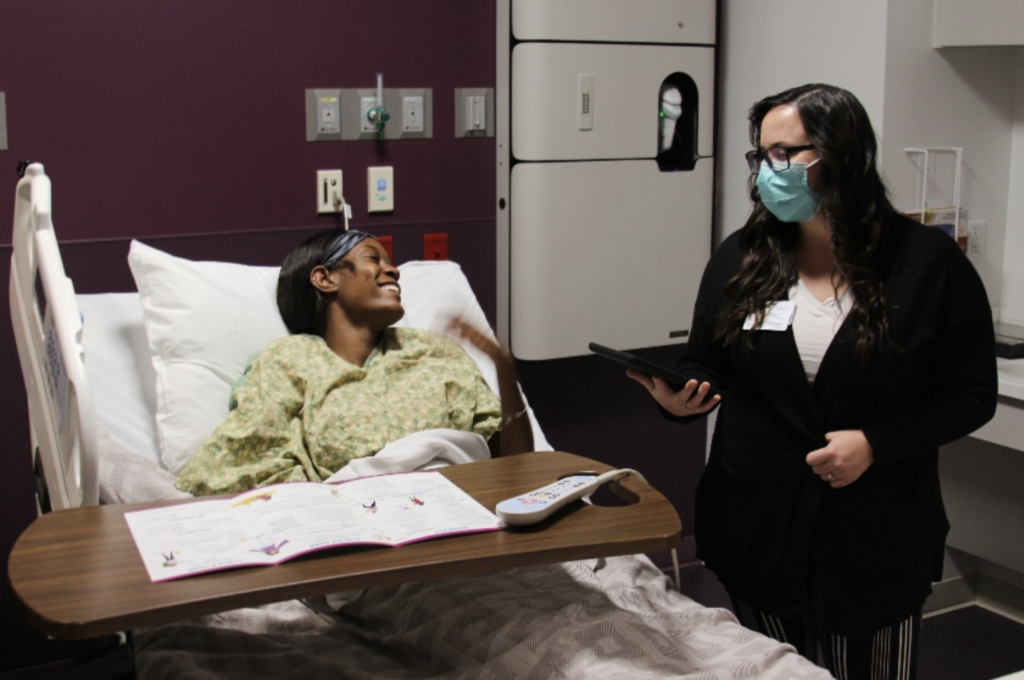How SMS Healthcare adjusts the AIDET framework to EVS
Being a patient in a hospital or other medical environment can be a scary experience.
Patients expect their medical providers to be not only experienced, skilled, and knowledgeable about the care they are delivering, but also want their provider to be able to communicate in a way that puts them at ease in an often difficult and uncomfortable environment.
And that’s why in every role at SMS Healthcare – Patient Advocate, Floor Technician, EVS Director, Housekeeper, Maintenance Technician, etc. – we expect our Care Team members to approach patients, their family members, coworkers, other healthcare staff, and visitors with genuine empathy. We encourage them to consider, “How would I want to be treated or spoken to if I was experiencing that person’s situation?”
SMS Healthcare saw the reality that EVS providers are cleaning in active patient rooms on a regular basis as an opportunity to positively impact the patient’s overall care experience and, while doing so, also help hospitals improve their HCAHPS scores. This led our team to AIDET®, which was developed by the Studer Group as the “Five Fundamentals of Patient Communication.”
The AIDET Communication Framework is currently in wide use by healthcare providers – with training and usage primarily focused on nurses, physicians, technicians, food service, and administrators. At SMS Healthcare, as a third-party provider to medical facilities, we developed an original spin on this tool and created our own program, based on the following EVS provider/patient communication structure:

Studer Group, now a Healthcare Consulting Solution of Huron Consulting Group Inc., has identified three common problems that stem from poor communication during patient-care interactions:
- Research from Huron shows that patients especially dislike feeling like just another number. Poor communication in care interactions can come across as indifference or a lack of empathy on the part of the provider, caregiver, or staff, which negatively impacts the patient’s perception of care.
- The research also confirms that patients want greater transparency in their care interactions. When patients don’t understand what a provider, nurse, technician, or any staff member is doing for them and why, the lack of clarity can lead to a lack of motivation to stay healthy, derailing adherence to treatment plans.
- Struggling to communicate with patients and their families during care interactions is a major source of burnout for physicians, nurses, and staff that spans organization type or medical expertise.
According to Huron, AIDET is a structure for communication that enables healthcare professionals to engage patients in a way that demonstrates empathy, improves clinical outcomes, and reduces burnout caused by miscommunication. This foundational tactic for effective patient communication is used by nurses, physicians, technicians, administrators, and all staff involved in patient and family encounters across the care continuum.
An advantage of the AIDET framework is that it’s flexible and customizable based on situational needs. It is not necessary to use every single component during each patient interaction.
Huron’s research indicates that the rapid pace of change in the industry, the complexities of medicine, and the growing importance of technical skills have overshadowed how essential empathy is in successfully treating patients. By using this flexible and consistent framework for communication, healthcare professionals can transform not only the patient experience but also their own working experience as a care provider.

The goal of AIDET is to deliver an exceptional care experience through a better communication practice centered on principles defined here by Huron:
- Think differently.
Recognize that communication with patients and their families sets the tone for the patient’s overall perception of care. - Plan differently.
Provide clinicians and staff with a standardized communication framework that helps them effectively convey empathy during patient interactions. - Act differently.
Help clinicians and staff make stronger connections to patients and their families in order to improve everyone’s well-being.
Most existing studies on the impact of AIDET are in the nurse/patient relationship – with conclusions that typically report slight improvements in patient satisfaction (around 10%) when care providers are provided with recurring AIDET training and encouraged to use the technique on a regular basis.
For EVS positions, SMS Healthcare has found that hiring outgoing and empathetic people and training them in AIDET principles can result in deeply rewarding work where our employees are empowered to interact with people in some of the most difficult phases of their lives. The genuine compassion shown by our EVS employees can provide patients with peace of mind in critical moments.
SMS Healthcare supports each department in the healthcare facilities we service. Our job is not to simply disinfect patient rooms, emergency rooms, operating rooms, office areas, etc. – but to play a greater role within the healthcare environment. Our collective mission is to be an extension of the medical staff’s goal of providing the best care possible.
With every surface we disinfect, we help protect everyone in your medical facility. AIDET helps us maintain our focus to do that with a smile and a kind word to everyone we meet.

